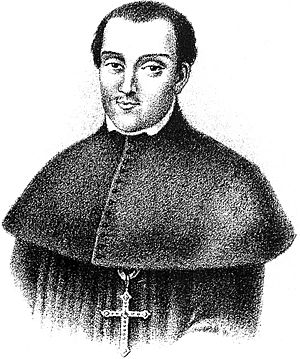Diego Ladrón de Guevara facts for kids
Quick facts for kids Most Reverend Diego Ladrón de Guevara |
|
|---|---|
| Bishop of Quito | |

Portrait by Evaristo San Cristóval
|
|
| Church | Catholic Church |
| Archdiocese | Bishop of Quito |
| In Office | 1704–1717 |
| Predecessor | Sancho de Andrade de Figueroa |
| Successor | Luis Francisco Romero |
| Orders | |
| Consecration | 1689 by Miguel Antonio de Benavides y Piedrola |
| Personal details | |
| Born | 1640 Sigüenza, Spain |
| Died | 9 November 1718 Mexico City, Mexico |
| Nationality | Spanish |
| Previous post | Bishop of Panamá (1689–1699) Bishop of Ayacucho o Huamanga (1699–1704) |
Diego Ladrón de Guevara (born in 1641 in Cifuentes, Spain – died September 9, 1718) was an important leader in the Catholic Church. He also served as a Spanish colonial administrator. From 1710 to 1716, he held the powerful position of viceroy of Peru. A viceroy was like a governor, ruling a large area for the King of Spain.
Contents
Early Life and Education
Diego Ladrón de Guevara studied theology, which is the study of religious faith. He attended the University of Alcalá de Henares in Spain. Later, he became a professor of law at the same university. He also taught at the University of Sigüenza.
Becoming a Bishop
In 1689, Diego Ladrón de Guevara was chosen to be the bishop of Panama. At that time, Panama was part of the Viceroyalty of Peru. He was consecrated, or officially made a bishop, by Miguel Antonio de Benavides y Piedrola. Bishop Benavides was the bishop of Cartagena.
While in Panama, he had some disagreements with the local governor. In 1695, he took on another important role. He became the president of the Audiencia of Panama. The Audiencia was a high court and council that helped govern the area.
Serving in Peru
After serving in Panama until 1699, he was named bishop of Ayacucho. This city, also known as Huamanga, is in what is now Peru. There, he helped open the University of San Cristóbal de Huamanga. He became its first leader, called a rector.
In 1703, he was appointed bishop of Quito. Quito was another important city in the Viceroyalty of Peru. He served as bishop there until 1710. He then resigned from this role to become the viceroy of Peru.
As Viceroy of Peru
Diego Ladrón de Guevara became the viceroy of Peru on August 30, 1710. He took over from an interim leader, Miguel Núñez de Sanabria. The previous viceroy, Manuel de Oms y de Santa Pau, had named Ladrón de Guevara as his successor.
During his time as viceroy, he focused on improving the economy.
- He increased the amount of silver produced in the mines of Potosí.
- He also encouraged mining in other areas like San Nicolás, Cajatambo, and Huancavelica.
- He controlled the making of a drink called aguardiente from sugar cane. He made sure only approved factories could make it and taxed them heavily.
He also had to deal with threats from privateers, who were like legal pirates. This was even after the Peace of Utrecht agreement in 1713. He also handled an uprising of enslaved people at a large farm near Lima.
Viceroy Ladrón de Guevara supported construction projects.
- He approved the rebuilding of the main cathedral in Lima.
- He also supported building other churches, like La Buena Muerte.
- He helped build the convent of the Mínimos de San Francisco de Paula.
- He created a new teaching position for anatomy at the University of San Marcos.
The Peace of Utrecht agreement allowed British ships to trade goods at the fair in Portobello.
Later Life
In 1716, Diego Ladrón de Guevara faced accusations and was removed from his position as viceroy. Mateo de la Mata Ponce de León took over as an interim leader.
Ladrón de Guevara then moved to New Spain, which is now Mexico. Before he passed away, he made arrangements for the remains of his relative, Diego Landa Calderón, to be returned to Spain. Diego Ladrón de Guevara died on September 9, 1718, in Mexico City. He was buried in the main cathedral there.
See also
 In Spanish: Diego Ladrón de Guevara para niños
In Spanish: Diego Ladrón de Guevara para niños
 | Anna J. Cooper |
 | Mary McLeod Bethune |
 | Lillie Mae Bradford |

